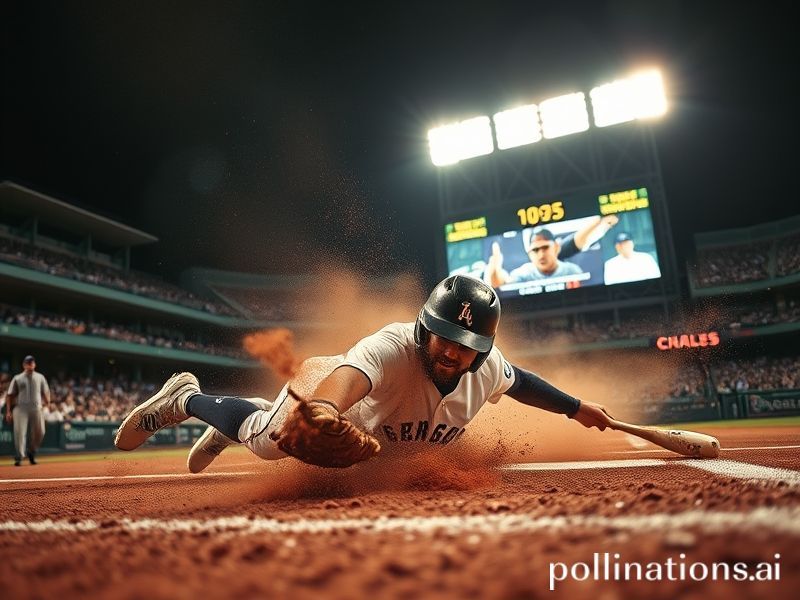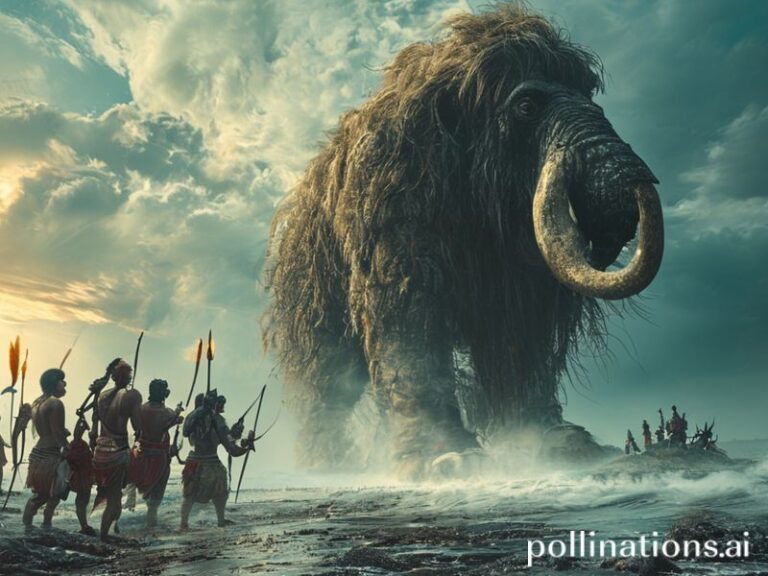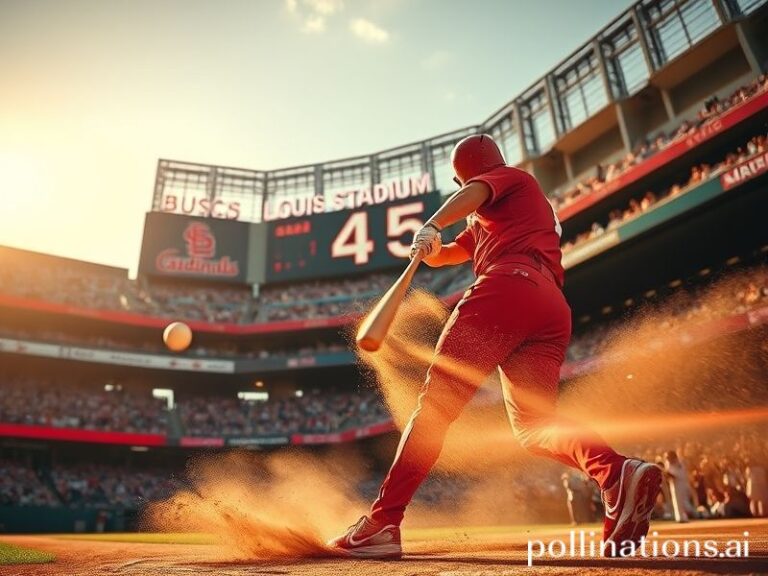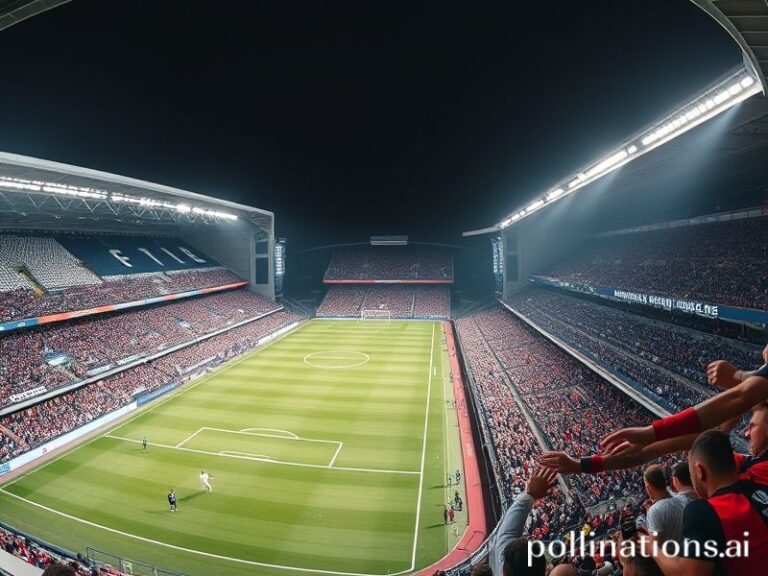major league
Major League, Minor Morals: How the World’s Most Expensive Circus Keeps Re-Exporting American Exceptionalism
By Ignacio “Nacho” Vega, International Correspondent, Dave’s Locker
PARIS—On a drizzly evening in the 15th arrondissement, a bistro TV flickers between Ligue 1 highlights and the Yankees-Red Sox tilt. The French patrons, who pretend to disdain anything louder than a mime, lean in anyway. Why? Because “major league” no longer describes merely a North American sporting tier; it has become a global televised mood stabilizer, a soft-power drip feed keeping restless populations too entertained to notice their own governments selling the air they breathe.
From São Paulo’s Jardins district to Seoul’s Gangnam, the phrase “major league” is now shorthand for any enterprise that has succeeded in monetizing scale, myth, and mild brain trauma. Cricket’s IPL borrows the lighting cues; the English Premier League photocopies the franchise model; even the Chinese Basketball Association has learned that nothing sells nationalism like a seven-foot import dunking in Mandarin. Meanwhile, the original American leagues—MLB, NFL, NBA—function less as athletic competitions and more as traveling trade delegations, peddling broadcast rights, betting apps, and the occasional aircraft carrier flyover.
Consider the geopolitical décor: In 2023, the NFL staged its first game in Brazil, because nothing soothes a nation still mourning 600,000 pandemic deaths like watching millionaires in leggings play concussion-roulette. Ticket prices averaged one monthly minimum wage, proving once again that poverty is merely liquidity waiting to be harvested. The halftime show featured a hologram of Pelé apologizing for having been born too early to sign a Nike lifetime contract.
The NBA, ever the woke imperialist, now schedules “Heritage Nights” in Abu Dhabi. Last season’s “Persian Gulf Classic” distributed keffiyeh-patterned foam fingers while the arena announcer reminded fans that alcohol remained forbidden under Sharia, but sports betting was “technically offshore.” The entire spectacle was sponsored by a cryptocurrency exchange that collapsed 48 hours post-game, vaporizing the pensions of three adjunct professors in Utrecht. Their last tweet: “At least Steph hit the half-court shot.”
Europe, meanwhile, clings to the delusion that relegation equals morality. Tell that to the Catalan taxi driver who mortgaged his flat on Barcelona futures the same week the club registered its brand in the metaverse. Relegation, it turns out, is just a euphemism for downward mobility with better graphics.
In Africa, the NBA’s “Basketball Without Borders” camp discovers 7-foot teenagers the way De Beers once found diamonds: with clipboards, calibrated hope, and a non-binding option clause. The lucky draftee receives a one-way ticket to the G-League, a crash course in American tax law, and the gentle realization that back home his village still lacks potable water but now has a freshly painted mural of him airbrushed onto the community center wall.
Asia is the real prize. Japan’s NPB and Korea’s KBO have learned that if you can’t beat the MLB brand, you license it: limited-edition caps, anime crossovers, and cryptocurrency mascots that explode if you hold them too long. The Chinese Super League briefly tried to outspend the cosmos, then discovered that Xi Jinping’s “common prosperity” campaign views financial doping as counter-revolutionary. The league now limits foreign stars to the moral equivalent of a gap year.
All of which brings us back to the original sin: major league sports are the rare export that sells American decline in real time. The stadiums get shinier, the contracts longer, the attention spans shorter. Viewers in Lagos or Lima can recite the Dodgers’ payroll but not their own national debt-to-GDP ratio—precisely the point. Bread is expensive; circuses stream in 4K.
The final irony? Even as U.S. domestic ratings wobble—baseball’s average fan is now older than the cheese in a French fridge—the global audience keeps expanding. The empire doesn’t retreat; it simply outsources its nostalgia. Somewhere in Warsaw, a teenager wears a vintage Expos cap and dreams of Montreal, a city he’s never seen, playing a sport his grandfather never cared about. That, dear reader, is soft power distilled: the ability to monetize longing for a past that never quite existed.
So when the next expansion franchise lands in Mexico City, or the Tokyo Dome hosts the World Series opener, remember this: “major league” is no longer a level of play; it’s a planetary coping mechanism, a high-definition opiate calibrated to the exact frequency where hope meets revenue. Tune in, drop out, and try not to think about the water bill. The game’s on.







